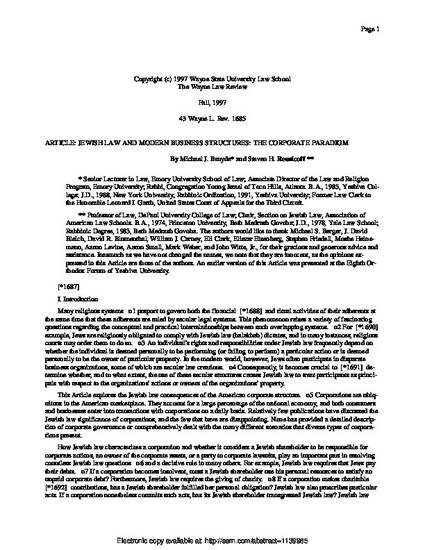
Article
Jewish Law and Modern Business Structures: the Corporate Paradigm
Wayne Law Review
(1997)
Abstract
Many religious systems purport to govern both the financial and ritual activities of their adherents at the same time that these activities are ruled by secular legal systems. This phenomenon raises fascinating questions regarding the conceptual and practical interrelationships between these overlapping systems. Under Jewish law, for instance, a persons rights or responsibilities may decisively depend on whether a person is deemed the owner of a particular piece of property. In contemporary times, however, Jews often participate in various business organizations that are, at least ostensibly, creations of secular law. As a result, it becomes critical to establish whether, and if so to what extent, such entities affect Jewish law's view of property rights.
This article specifically focuses on the interplay between the secular law's corporate construct and Jewish law. The article first identifies and explores various secular theories regarding the essence of a corporation and the status of corporate shareholders. The article then exhaustively examines the alternative ways in which corporations are perceived by Jewish law authorities and the consequences of each.
Keywords
- Jewish,
- halakha,
- corporation,
- Talmud,
- partnership,
- rabbinical courts,
- stockholder,
- shareholder,
- stakeholder,
- religious,
- dina demalkhuta dina,
- Shulhan Arukh,
- hefker beit din
Disciplines
Publication Date
Fall 1997
Citation Information
Michael J. Broyde; Steven H. Resnicoff, Jewish Law and Modern Business Structures: The Corporate Paradigm, 43 Wayne L. Rev. 1685, 1818 (1997)
